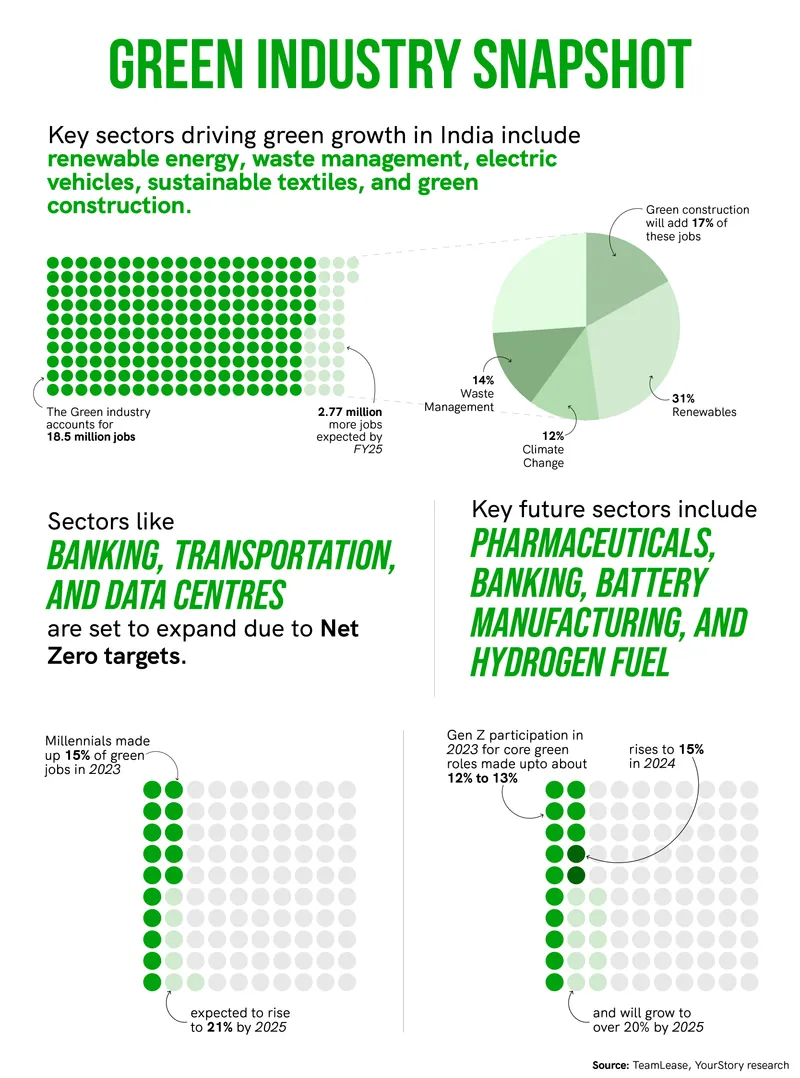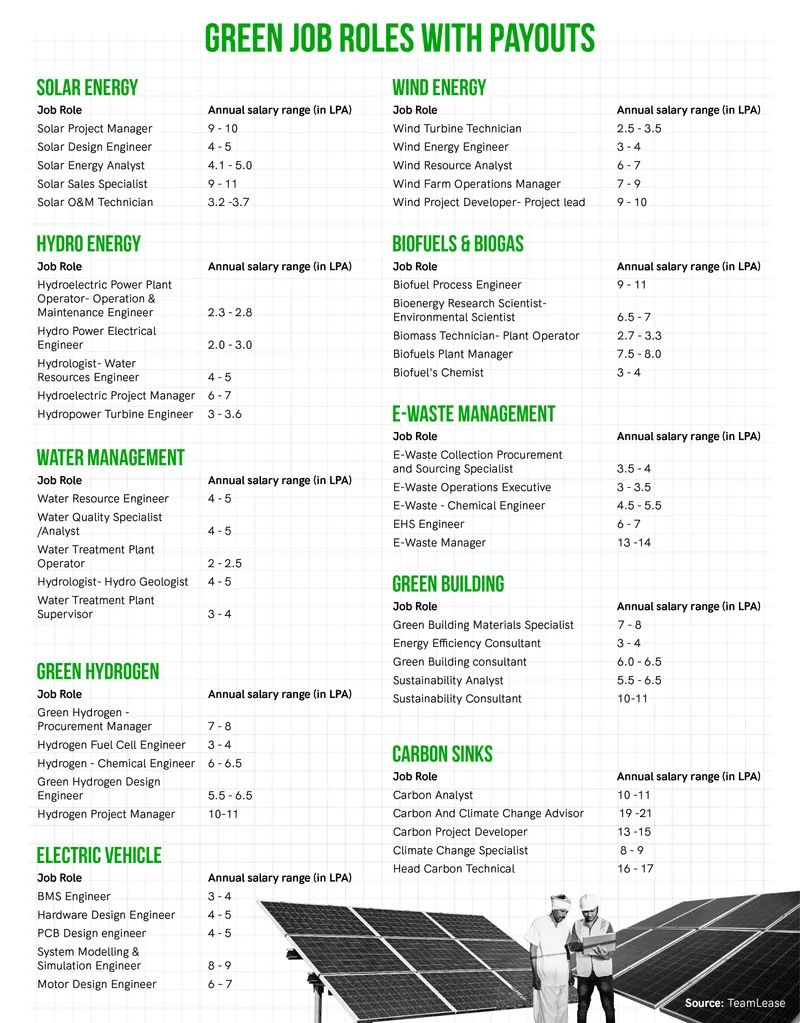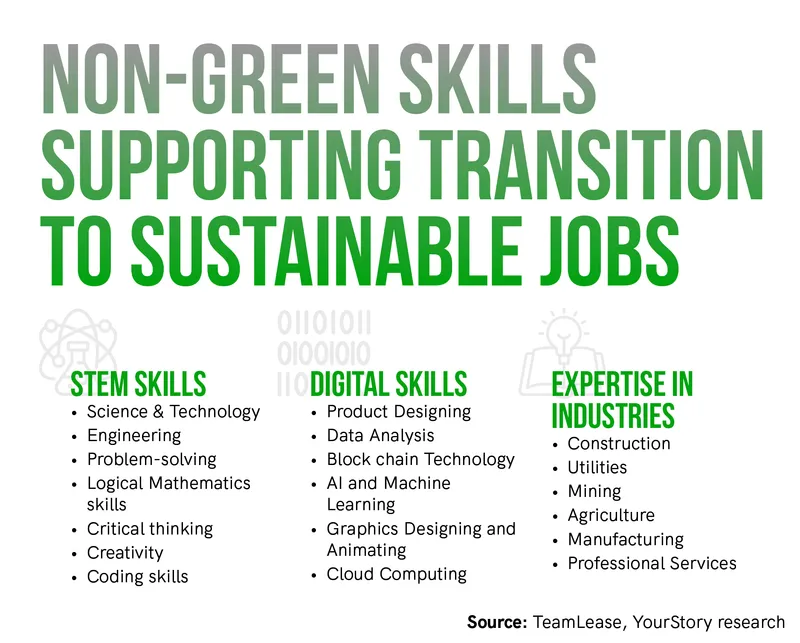Green pastures: Green jobs market awaits skilled talent amid ripe opportunities
Green jobs offer lucrative career paths for experienced professionals and fresh graduates across multiple sectors. However, addressing the growing skills gap is crucial for meeting rising demand and sustainability goals.
In the bustling tech hub of Hyderabad, where ancient minarets jostle for skyline space with gleaming office towers, nineteen-year-old Satyavathi Kolapalli is contemplating a future that bridges two seemingly disparate worlds: semiconductors and sustainability.
“I can pursue my core field in electronics and aim to enter the semiconductor industry after graduating, where I plan to drive innovation by integrating sustainability into the work I do,” Kolapalli—a second-year B. Tech. student in Electronics and Communication at Hyderabad’s Malla Reddy College of Engineering for Women—shares her plans with YourStory.
The recent, harrowing hurricanes in North America and unprecedented rainfall in many parts of India, including the deadly landslides in Kerala, were not merely isolated climate events. It’s only the beginning of what our planet’s future holds if climate change is not controlled.
While modern-day industrialisation cannot be fully stopped, the world must transition to a sustainable, low-carbon economy—facilitated by creating green jobs.
Green jobs are roles that contribute to environmental sustainability by reducing emissions, conserving resources, and promoting eco-friendly practices.
These jobs are ripe with career growth opportunities for experienced professionals, while they open up diverse pathways for fresh graduates, expanding options beyond traditional tech careers.
Most green jobs are found in renewable energy (solar, wind, hydro, biofuels, biogas), water management, e-waste management, green hydrogen, green building, and electric vehicles, among other sectors.
Despite these jobs being in demand, the green sector cannot fill these positions owing to a significant skill gap. This is where Indian institutions, including the IITs, NITs, and central universities—with their green skilling programmes—come into the picture.
Some of these courses are IIT Kanpur’s e-Masters in climate finance and sustainability, IIT Delhi’s MTech in environmental engineering and management, IISC Bengaluru’s MTech in sustainable technologies, and IIT Kharagpur’s MTech in renewable energy technologies.
Besides, the National Skill Development Corporation, Ministry of New and Renewable Energy, Confederation of Indian Industry, and National Solar Energy Institute provide green skills training in renewable energy, energy efficiency, and waste management sectors through various channels, including government colleges and polytechnics.
Today, green skills such as artificial intelligence (AI), sustainable design, data analysis, and project management, coupled with traditional green expertise, are most sought after in the jobs market.

Infographic design: Nihar Apte
Addressing the skill gap early
According to LinkedIn’s Global Climate Talent Stocktake 2024, the gap between the demand for green talent and its availability is rapidly widening. While demand increased by 11.6% from 2023 to 2024, the supply grew by only 5.6%. If these trends continue, there will be twice as many jobs requiring green skills as there are qualified candidates by 2050.
So, where does one begin?
For young learners like Kolapalli, green skilling has already begun. This year, the Telangana Department of Information Technology, Electronics, and Communications launched the Green Skills Academy in Hyderabad in partnership with 1M1B (One Million for One Billion), a UN-accredited nonprofit.
After five months of leadership training and problem-solving skills development at the academy, she will present her project, “Nurture Sapling,” at the United Nations headquarters, addressing the UN Sustainable Development Goal 2: Zero Hunger.
The academy—which targets young adults aged 18–25—has collaborated with the Telangana Academy for Skill and Knowledge (TASK), T-Hub, and T-Works to fill the skills gap by offering theoretical knowledge and practical experience in green skills, sustainability, and AI. Around 500 learners have completed the programme so far.
According to T-Hub CEO Mahankali Srinivas Rao, the initiative by the Telangana government to establish the academy will raise awareness and prepare young people to seize opportunities in the green jobs space. The partnership aims to train one million youth from Telangana by 2030.
“The curriculum [of the programme] is fairly engaging with a lot of exponential learning, and the feedback has been uniformly positive,” Rao says, adding that they will build on it.
Comparing it to learning subjects like maths, physics, or chemistry, he says the green initiative should be integrated as a core part of education rather than treated as a separate or discretionary effort.
Engineering students from nearly 400-500 colleges under TASK will benefit from this initiative, where selected students will undergo a 60-hour internship—contributing 40 hours to a live project and 20 hours to lectures and mentorship.
Manav Subodh, Founder and Chief Mentor of 1M1B, calls the academy a “finishing school” for those looking to enter green jobs.
He says 1M1B has also collaborated with the All India Council for Technical Education (AICTE), a national statutory body for technical education, to provide a 60-hour internship to any engineering student from an AICTE-approved institution.
Students can earn two credits with the internship, which they can complete in three months in an accelerated format or six months in a more flexible format.
Post the internship, they can also participate in fellowships lasting from six months to one year—coordinated with 1,000 small and medium businesses. A basic fellowship stipend could range from Rs 10,000 to Rs 35,000 per month.
“The majority of participants are going to get placed because they possess these green skills, gaining real-world exposure. They may be recruited by major food and beverage companies, large manufacturing firms, or significant players in the iron and steel industry,” Subodh explains.
In the tech sector, freshers typically make up about 33% of new hires across various functions, Munira Loliwala, Vice President of Business Strategy and Growth at TeamLease Digital, tells YourStory.
She adds the intake of freshers is lower—currently around 10-12%—in green sectors, but it is expected to grow over time.

Infographic design: Nihar Apte
Green job opportunities
The green industry in India, Loliwala says, accounted for about 18.5 million jobs in FY23, with an anticipated addition of 2.77 million jobs by FY25.
The ‘Gearing Up the Workforce for a Green Economy’ report by the Skill Council for Green Jobs, predicts India could create 35 million green jobs by 2047 in renewable energy, waste management, EVs, green construction, and sustainable textiles sectors.
Green jobs can be split into technical roles (63%) where software developers, IT specialists, etc., use technology to tackle environmental issues. The non-technical roles (37%) require specialised environmental expertise like engineers, planners, geologists, etc.
Despite opportunities, Loliwala highlights a shortage of talent in senior leadership roles within green jobs. It raises the need to focus on reskilling leaders to fill these positions, as they are essential for moving up the value chain and building strong teams.
“If you have a strong leader, the intake of freshers will automatically increase, creating a strong value proposition,” she explains.
Many people can transition into green jobs, which often offer higher salaries and better titles—moving from task-based positions to strategic roles like portfolio managers or researchers. Non-tech professionals, such as law or finance graduates, can also shift easily with relevant qualifications.
According to Subodh, there’s more action in the upskilling sector because many mid-career professionals feel stuck, leading to a rise in climate-related career pivots.
The rising demand for green jobs has led to greater interest in upskilling courses that combine traditional green skills with digital competencies like AI, data analytics, and project management.
Online platforms, including Coursera, edX, Udacity, LinkedIn Learning, Eruditus, and upGrad, are also joining the bandwagon to offer relevant courses, making it easier for individuals to gain the skills needed for green job opportunities.
Loliwala notes that experienced professionals in green jobs can expect a compensation increase, often exceeding 30-35%, while freshers typically earn salaries about 10-15% higher than those in traditional job markets.

Infographic design: Nihar Apte
Towards a sustainable future
India aims for net-zero emissions by 2070 and 50% of energy from non-fossil sources by 2030, and achieving these will require a workforce skilled in green competencies.
Resistance to change, lack of expertise, and cost issues—coupled with a shortage of formal job training in this area—have marred many companies from adopting green solutions.
Loliwala explains that most training is provided in a fragmented manner, and this skills gap presents a major obstacle to achieving a sustainable economy.
She further notes that multiple policies at different levels complicate implementation, resulting in the concept remaining a topic of discussion rather than action.
That said, T-Hub’s Rao believes this is a national priority. While states like Maharashtra and Gujarat have moved ahead, others are progressing more slowly, and it’s only a matter of time before they all catch up.
India’s planned transition to a net-zero economy offers significant opportunities for job creation and economic growth, generating over 50 million green jobs, and adding more than $15 trillion to the economy.
As for many young learners like Kolapalli, who will present her project at the 1M1B Activate Impact Summit at the UN headquarters in December 2024, the future looks bright with growing opportunities in the green jobs space as long as the skill gap continues to narrow.
“It is a good start, but there is a long way to go,” says Rao.
(Cover image and infographics designed by Nihar Apte.)
Edited by Suman Singh







